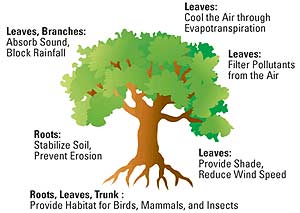The Benefits of Trees: Enhancing Our Environment and Well-being
Trees are not only beautiful and majestic, but they also provide numerous benefits to our environment and overall well-being. In this article, we will explore the various advantages that trees offer, from improving air quality to enhancing mental health.
Environmental Benefits
Trees play a vital role in maintaining a healthy environment. They act as natural air filters, absorbing harmful pollutants and releasing oxygen into the atmosphere. By reducing air pollution, trees contribute to the prevention of respiratory diseases and promote cleaner, fresher air for us to breathe.
Moreover, trees are essential in the fight against climate change. Through the process of photosynthesis, they absorb carbon dioxide, a major greenhouse gas, and help mitigate its impact on global warming. By planting more trees, we can actively combat climate change and work towards a greener future.
Ecological Benefits
The presence of trees in our ecosystems is crucial for maintaining biodiversity. They provide habitats and food sources for a wide variety of animal species, including birds, insects, and mammals. Trees also contribute to the preservation of natural resources and the prevention of soil erosion.
Forests, in particular, are vital ecosystems that support countless plant and animal species. They act as carbon sinks, absorbing large amounts of carbon dioxide and storing it in their biomass. Protecting and preserving forests is essential for the overall health of our planet.
Economic Benefits
Trees offer numerous economic benefits to communities and individuals alike. They increase property values, making neighborhoods more attractive and desirable. Studies have shown that homes surrounded by trees tend to sell at higher prices and have a higher occupancy rate.
Furthermore, trees provide shade, reducing the need for air conditioning during hot summer months. This leads to lower energy consumption and, consequently, lower electricity bills. Additionally, trees act as windbreaks, reducing heating costs during colder seasons.
Health Benefits
Spending time in nature has been proven to have positive effects on our mental and physical well-being. Trees, in particular, contribute to these benefits. The presence of trees in urban areas has been linked to reduced stress levels, improved mood, and increased overall happiness.
Furthermore, trees have a calming effect on our minds and can help lower blood pressure. Research has shown that hospital patients with a view of trees from their windows tend to recover faster and require fewer pain medications compared to those without such a view.
Social Benefits
Trees have a significant impact on our social well-being. They create green spaces where communities can gather, relax, and engage in recreational activities. Parks and tree-lined streets not only enhance the aesthetics of our cities but also promote social interaction and a sense of community.
Moreover, trees provide a natural sound barrier, reducing noise pollution from traffic and other urban activities. This contributes to a quieter and more peaceful environment, improving the quality of life for residents.

Trees are an invaluable asset to our environment and society. From their environmental and ecological benefits to their positive impacts on our health and well-being, they play a crucial role in enhancing our lives. By recognizing and appreciating the benefits of trees, we can work towards their preservation and ensure a greener, healthier future for generations to come.
Frequently Asked Questions
1. Why are trees important?
Trees are important for various reasons. They provide oxygen, improve air quality, conserve water, support wildlife, reduce energy costs, and enhance the overall aesthetics of an area.
2. How do trees improve air quality?
Trees absorb carbon dioxide and release oxygen through photosynthesis. They also trap airborne particles, such as dust and pollutants, helping to improve air quality by reducing the concentration of harmful substances.
3. Can trees help conserve water?
Yes, trees play a vital role in water conservation. Their canopies act as natural umbrellas, reducing the impact of raindrops and allowing water to infiltrate the soil. Tree roots also help prevent soil erosion and retain water, reducing runoff and improving water quality.
4. Do trees support wildlife?
Absolutely! Trees provide habitat, food, and shelter for a wide range of wildlife species. They offer nesting sites for birds, homes for insects, and food sources for many animals, contributing to biodiversity and ecological balance.
5. How can trees reduce energy costs?
Trees provide shade during hot summer months, reducing the need for air conditioning. They also act as windbreaks in winter, helping to lower heating costs. By strategically planting trees around buildings, energy consumption can be significantly reduced.
6. What are the aesthetic benefits of trees?
Trees enhance the beauty of landscapes, parks, and urban areas. They provide a sense of tranquility and serenity, create green spaces for recreational activities, and contribute to the overall well-being of communities.
7. Do trees have any health benefits?
Yes, trees offer several health benefits. Being around trees and green spaces has been shown to reduce stress, improve mental health, and enhance overall well-being. They also help filter pollutants from the air, promoting better respiratory health.
8. Can trees help combat climate change?
Yes, trees play a crucial role in mitigating climate change. They absorb carbon dioxide, a greenhouse gas, from the atmosphere and store it in their trunks, branches, and roots. This helps reduce the concentration of greenhouse gases, thus combating global warming.
9. How do trees contribute to soil health?
Trees improve soil health by preventing erosion, enhancing soil fertility, and promoting nutrient cycling. Their fallen leaves act as natural mulch, enriching the soil with organic matter and providing a favorable environment for beneficial soil organisms.
10. Are there economic benefits to planting trees?
Absolutely! Trees can increase property values, attract tourism, and boost local economies. They also help reduce energy costs, saving money on heating and cooling bills. Additionally, the timber industry relies on trees for various wood products, contributing to economic growth.




